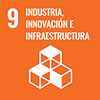«Blockchain» and cryptocurrencies: Bitcoin
The main aim of this article is to explain how a computer process, the «Blockchain» or chain of blocks, can generate the necessary trust for the creation, acceptance and increasingly widespread use of digital currencies, under a new concept or paradigm of money not maintained by any state or supranational entity: cryptocurrencies. In order to understand this process, the technical aspects of how the blockchain operates and how it has managed to generate confidence in the end user are explained first. Secondly, its implementation will be analyzed through the best known of all, Bitcoin, and through the data related to the expansion and use of the main cryptocurrencies in a market that in the last two years has multiplied by 65, reaching half a trillion dollars. This work closes by exposing the main conclusions and reflections.
ODS


 José Miguel Domínguez Jurado
José Miguel Domínguez JuradoPhD in Economics from the University of Cádiz. Master’s Degree in Territorial and Environmental Impacts of Globalisation from the International University of Andalucía. Bachelor’s Degree in Economic and Business Sciences from the University of Málaga. He is a lecturer of Applied Economics, teaching various subjects related to Economic Analysis in undergraduate degree studies and Regional Economics on the Official Master’s programme. He collaborates as a teacher in programmes for students of universities in the United States in the subjects of Regional and Urban Economics. He was a principal investigator at UCA on the European Union INTERREG PRESPO project, and has participated in other national and international projects.
 Ricardo García Ruiz
Ricardo García RuizPhD in Economics from the International University of Barcelona. Master’s Degree in Information and Knowledge Societies from the UOC. Degree in Computer Engineering from the UOC. Master’s Degree in Advanced Techniques in Applied Statistics from UNED. Expert Diploma in Advanced Methods in Applied Statistics from UNED. He currently works as an associate lecturer on the Information and Documentation Degree, teaching the Big Data and Data Mining subjects.



